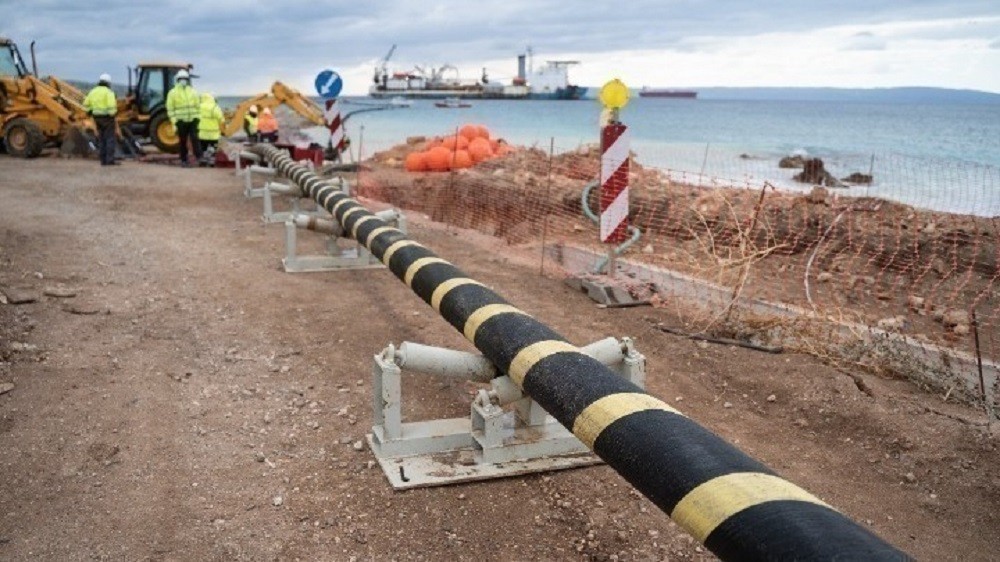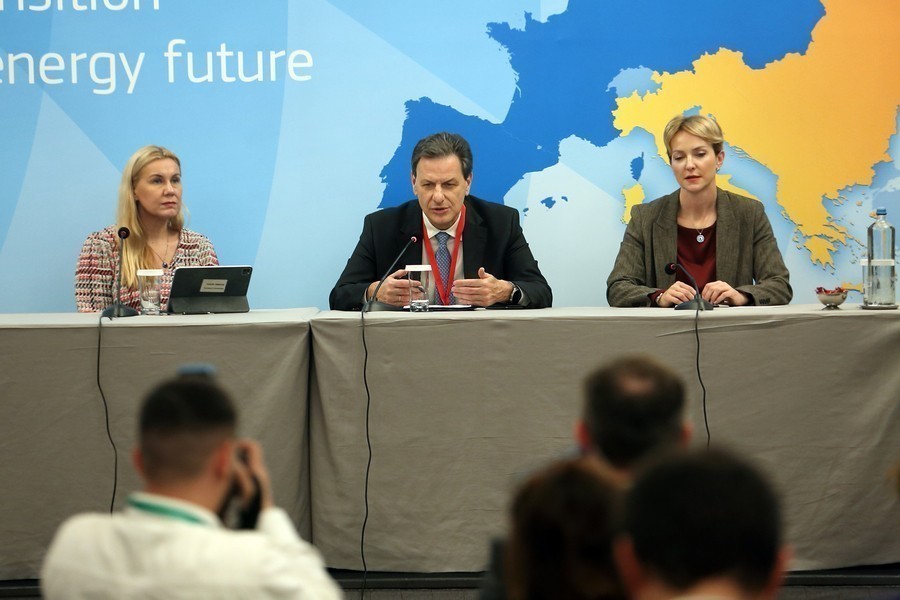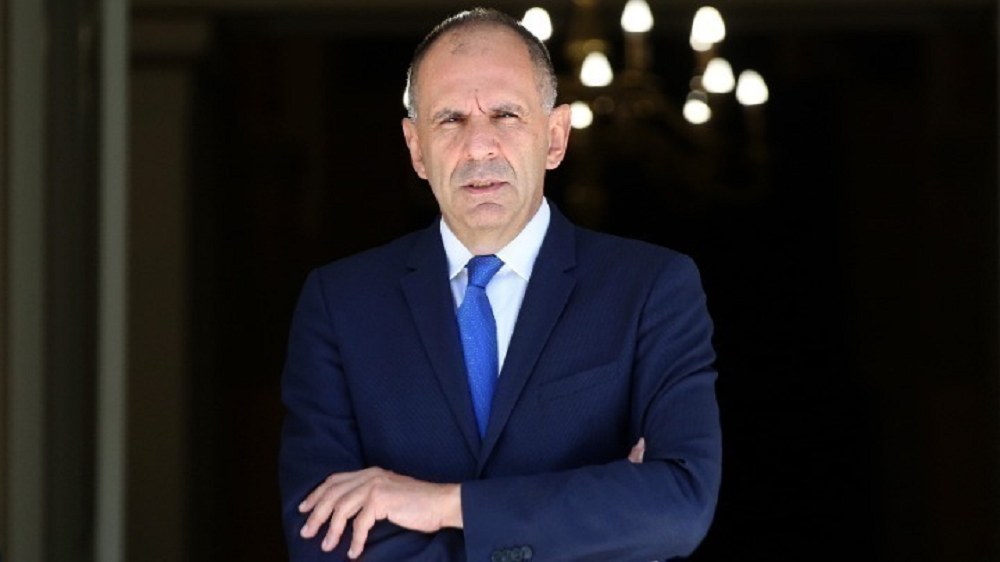
New Greece-Bulgaria power interconnection officially inaugurated at CESEC meeting in Athens

The Minister of Energy Theodoros Skylakakis (R), the European Commissioner responsible for Energy Kadri Simpson (R) and the Deputy Minister of Energy Alexandra Sdoukou (R), make statements, after the completion of the work of CESEC, Friday January 19, 2024. APE-MPE /APE-MPE/Alexandros Beltes
The importance of the second power grid connection between Greece and Bulgaria for the Southeast European electricity market was highlighted at the project’s formal inauguration on Friday, in the context of the ministerial meeting of the Central and South Eastern Europe Energy Connectivity (CESEC) group.
Welcoming the agreement with addresses were Greek Environment & Energy Minister Theodoros Skylakakis, Bulgarian Energy Minister Rumen Radev, European Commissioner for Energy Kadri Simson, Greek Independent Power Transmission Operator (IPTO) Chairman and CEO Manos Manousakis, and Bulgarian Electricity System Operator (ESO EAD) Chairman and CEO Angelin Tsachev.
Also attending were Deputy Environment & Energy Minister Alexandra Sdoukou, Bulgarian Deputy Energy Minister Iva Petrova, and European Commission Director-General for Energy Ditte Juul Jørgensen.
The second 400 kV extra-high voltage transmission line (Nea Santa-Maritsa East) connecting the two countries began operation in the summer of 2023, significantly increasing the capacity of energy exchange between the neighboring systems of Greece and Bulgaria and upgrading the opportunity for interborder trade and energy security in Southeastern Europe and the Balkans.
Statements
Commenting on the official inauguration, Environment & Energy Minister Skylakakis said, “Due to the climate crisis, green transition cannot and will not under any circumstances be interrupted. With the second Greece-Bulgaria interconnection, the greatest nominal margin of energy exchanges between the two countries now totals 1.7 GW. This is the largest interconnection with any other neighboring country and highlights the importance of this new infrastructure, one of the most beneficial that two countries share.
“The value of the new interconnection is very high. I am particularly pleased that I had this excellent and close cooperation with friends and partners from Bulgaria. We shall move forward as quickly as possible in every aspect,and collaborate in the coming years to create economic, environmental, and social benefits through our initiatives in the energy field. In the future we envision a new 2 GW interconnection of continuous power between Greece and Bulgaria, with which even greater volumes of green energy will be transferred from Greece, with electric energy coming from the Bulgarian side as well.”
Bulgarian Energy Minister Raven noted, “This is a very important moment. The greatest interconnection between Greece and Bulgaria, the second extra-high voltage line, is now a reality. We will continue to work together in order to interconnect as much as possible, with a joint vision of stronger energy security, clean power supply, and support for the objectives of decarbonization, not just of our own countries but of the greater region. Congratulations to the operators of both countries for their excellent collaboration and the timely completion of the project.”
Energy Commissioner Simson said, “The completion of the Greece-Bulgaria power interconnetion is a significant milestone for the differentiation of energy sources, the deepening of the EU’s electricity market, and Greece’s and Bulgaria’s move away from coal use – given Greece’s ability to become a significant source of ‘green’ energy, and having the convinction that this intercoonection will bring long-term benefits to the entire region, as it comprises a noteworthy achievement of regional collaboration between CESEC countries and another success story for the EU’s policy of infrastructures. The investment benefited from funding of nearly 29 million euros from the EE Connecting Europe Facility mechanism. I would like to congratulate the transmission system operators, the regulatory authorities, and the governments of Greece and Bulgaria for their effective collaboration.”
IPTO Chairman and CEO Manousakis added, “Today we are inaugurating a significant Project of Common Interest (PCI) implemented with funding from the European Commission. With the new electricity interconnection between Greece and Bulgaria we now have expanded by 500 MW the margin for energy exchanges between the two countries. For Greece this means that we will import cheap energy and in the medium term export even more green energy, as the domestic market penetration of renewable energy sources will keep increasing. Given the fact our markets are linked, this will become mutually beneficial for the promotion of clean energy in the region. We have developed close synergies with ESO EAD, which extend beyond the field of energy, into telecommunications. In the midst of energy transition, collaboration between operators must become more intense. That is why we are particularly happy that our collaboration with Bulgaria’s operator is a model cooperation in terms of how we must move at regional level.”
ESO EAD Chairman and CEO Tsachev added, “Following the successful operation of the Maritsa East-Nea Santa line, we now have two interborder electricity transmission lines in operation, resulting in the improved interconnectivity and the increase of our transfer capacity. The expanded capacities of ESO and IPTO’s infrastructure for electric power transmission differentiate our operation. They provide us with the opportunity to also offer telecommunications services to our clients. The second interconnection of Greece with Bulgaria is a project of pan-European interest that was incorporated from the start of its planning to ENTSO-E’s Ten-Year Network Development Plan along with the list of the European Unions PCIs, drawing funding from the Connecting Europe Facility mechanism.”
Source: ANA – MPA
Ακολουθήστε τη HELLAS JOURNAL στη NEWS GOOGLEPM Mitsotakis to Bloomberg TV: 2024 will be a good year for the Greek economy

